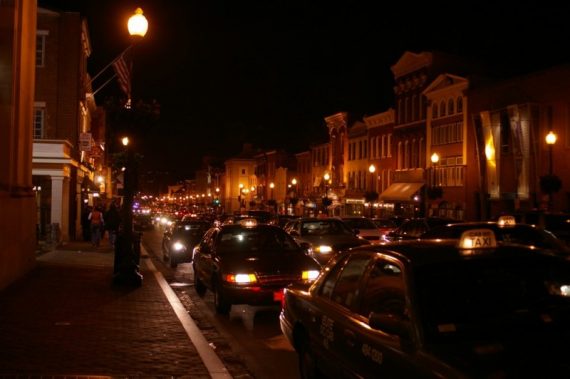Cities Matter More Than Ever
Despite recurring predictions that the Internet and mass communications would allow people to work from anywhere, talent continues to cluster in big cities.
Mario Polèse explains “Why Big Cities Matter More than Ever,” despite recurring predictions that the Internet and mass communications would allow people to work from anywhere.
In rich nations today, urbanization levels are on the order of 80 percent or higher. China and India are urbanizing at breakneck speed, with Shanghai and Bombay racing each other to become the world’s largest metropolitan area and eclipse Tokyo (currently 33 million strong). Why is it that cities have lost none of their powers of attraction, despite the new freedom that information technology brings individuals and firms? The economic advantages of cities—of urban “agglomeration,” in the language of the people who study these things—are difficult to measure precisely and not the same for all firms.
He lists Seven Pillars of Agglomeration, the first several of which are obvious (economies of scale in production and transportation) but apply mostly to manufacturing. For most of the West, that’s passé. But many apply even more crucially in the Information Age.
Proximity brings numerous advantages. To name just one: face-to-face contacts remain essential for the most valuable and sensitive information. Finance, among the most spatially concentrated of industries, is an obvious example. Trust must be constantly renewed; millions of dollars will be committed based on a brief encounter. The greater the risks and sums involved, the greater the need for relationships built on something more than e-mail exchanges. Body language, facial expressions, and eye contact are among the signals that financial workers use to judge others.
Personal contact is also crucial in industries where creativity, inspiration, and imagination are vital inputs. For firms working in these rapidly evolving industries—high fashion, say, or computer graphics—the surest way to stay on top of the latest news is to locate near similar firms. The more that information can be transmitted electronically, it seems, the more valuable becomes information that cannot be so transmitted. Electronic and face-to-face communications tend to be complements; business travel, for example, has accelerated since the advent of the Internet. The more people communicate, the more they want to meet in the flesh.
Lower recruitment and training costs are additional advantages of proximity, particularly in highly specialized fields. A firm clearly benefits if it can hire from a pool of available workers with relevant training acquired at previous employers. The chances of finding a first-rate, experienced screenwriter will be a lot better in Los Angeles than in Baton Rouge.
Companies that require a wide array of talents, across a broad range of industries, will be drawn to big cities as well. Thus pillar five: the advantages of diversity. Consider advertising, a field whose products are constantly changing and come with no blueprint. Successful ad firms must rapidly assemble dizzying combinations of expertise and talent according to various clients’ needs. Each ad campaign, after all, is unique: one may call for animation, another for symphonic music, a third for trained chimpanzees. Where better to find the necessary components than in big cities, with their myriad industry clusters?
Certainly, this has been my experience. I can frankly write from anywhere. But connections matter and, in the politics and foreign affairs realm, they’re going to be made in Washington and, to a lesser extent, New York. In DC, I could, if I chose, attend half a dozen interesting events every weekday and network with important people in the field. I simply couldn’t do that in, say, Nashville.
A related advantage is that, if my day job goes away — as it has twice since I moved up here eight years ago — there’s an excellent chance that I will be able to find comparable employment without moving. There are only a handful of places on the planet where that would be the case, all of them major cities. cit
And then there’s this:
Finally, there’s pillar seven: buzz and bright lights. Talented and ambitious people benefit from being in a big city, just as firms do—in part because the companies can hire talented and ambitious workers. Some people move to cities not just because they need to make a living (though being in a metropolis does offer all the advantages of a diverse labor market) but also because they want to be where the action is. Ambition, dreams, the need for recognition—all are powerful forces in human behavior. Many a young man or woman will ask: Where are my chances best of meeting the right people and doing exciting things? The answer, for good reason, will often be the big city. Why, indeed, are some people willing to spend small fortunes for apartments on Fifth Avenue or homes in Beverly Hills if not to feel that they are truly at the center?
Whether because of my personality, my age, or my upbringing, this is of less interest to me than many. And, indeed, my wife and I have chosen a nice home in the suburbs rather than an apartment on Dupont Circle — which means I’m seldom actually in DC proper in the evenings. But it’s an undeniable draw for young talent.
Indeed, I was frequently amused when I lived in small town Alabama how little people there understood this. I was president of the local Kiwanis club and we frequently had international students come in and give talks about their homeland. Invariably, someone would ask them how they like it here, fully expecting that they will be amazed by the wonders that America has to offer and how awesome it was compared to their horrible Third World country. Most of the time, though, the kids were trying to figure out a polite way not to tell us how incredibly boring it is living out in the middle of nowhere when you’re used to a bustling city with an exciting night life.
Georgetown photo courtesy Hin’s Photoblog







When I started programming in the 80’s, I’d talk about that happy future where I could work from anywhere. The tech took much longer than I expected. In fact we are barely there now. Rural internet speeds are low, and I now accept that cultural factors are larger than I expected.
500 years ago Baldassare Castiglione wrote that we achieve advancement by doing good, but it is generally better to be seen doing good. (In his context: be brave in battle, but when the king is watching.)
I have worked with people connecting in from Russia, Japan, and the Philippines. Some of them did make themselves starts, but they had to work hard “to be seen.”
And of course that’s the other side of the equation. Rather than me-in-Oregon, it was Anton in Russia. An unexpected consequence of internet globalization, that if you are going to outsource, why not go all the way?
“make themselves [stars]”
I think we need to be more consistent and systematic in our definition of what a city is if this discussion is to make any sense. James, do you live in Washington, DC? Or do you live in the suburbs or exurbs or Washington, DC?
I live in Chicago but growth here hasn’t been in Chicago proper but in the suburbs, mostly the suburbs that are thirty miles outside the city.
If we define “city” simply as “where people live” then, yes, people continue to live where people live.
If anything, the economic situation for cities would be even more favorable without a variety of government rules and subsidies for suburban and rural living. Think of the difference in internet speeds (it’s easier to set up the infrastructure in an urbanized area), transport costs (most of the suburbs and rural areas basically get subsidized mail via the USPS), and so forth.
It’s not the cities that matter but the collection of people. Paul Graham wrote about this back in 2008: Cities and Ambition Cities are just convenient places for the collections to aggregate since we have all that infrastructure already in place. And as Graham points out it matters what the group ambition is for the collection of people. Silicon Valley isn’t a city but if you want to make it in high tech, that is where your go. And of course, not all infrastructure will draw a collection, e.g., Detroit.
In James’ case, he’d hardly be able to pursue his ambition in say Chicago regardless of how well funded the foundation was since the collection of people in Chicago have different ambitions than those in DC. While DC is the Capitol, it has also collected most of those irritating over achievers from high school who want to use authoritarian power and clique discipline to irritate and impose their ideas on others. So if you wish to advise or enact you have to go to DC. Later, when you have your contacts you can move elsewhere but in the young and middle years, you have to be in the trenches making your bones.
It’s not the “city”, which is just infrastructure, that matters anymore but where the collection of people come together, that could happen in cyberspace at some point but we’ll still need a few physical collection points for those ambitions that run on “who you know”(DC) or external displays (NYC’s emphasis on wealth).
Silicon Vally is Hollywood for computers … but more sprawl than city. A lot of auto-centered regions are sprawl.
@Dave Schuler
I live in the suburbs (Alexandria – Fairfax County, not City of) and commute in 4 days a week to downtown DC. Sprawl has put pockets of the DC government-defense contractor-lobbyist-think tank community all around the area. Being around the White House-Capitol Hill-K Street corridor is ideal (and where I work) but it’s not necessary.
“But it’s an undeniable draw for young talent.”
And for old notalent. As I’ve said here before, if I could afford it, I’d move to New York in a New York minute. There’s just something about the sheer energy of big cities that thrills me in ways I can’t really describe.